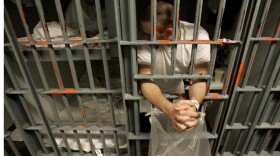Prison officials have made a host of changes in the wake of the killings of two staffers by two inmates at the Anamosa State Penitentiary on March 23, reshuffling wardens across facilities, freezing inmate job assignments, and putting other work opportunities on hold. While some steps appear temporary, advocates are concerned that the attack could lead to a broader rollback of opportunities behind bars.
Before the attack at Anamosa, Anji’s brother prided himself on working maintenance at the prison. At times, he worked unsupervised, carrying his tools to his job site and then reporting back when he was done.
Anji says officers trusted her brother so much, he even helped repair locks on cell doors.
“He has to be quite trustworthy in order to have that responsibility,” she said. “Even though it was dirty and it was messy, he takes pride in his work. He feels like he…he has a sense of purpose.”
IPR is withholding Anji’s last name because her brother is appealing his case and fears negative repercussions.
Working maintenance gave him a routine and goals and tangible skills he can use on the outside. But Anji says that’s been taken away since the attack, when two inmates who worked maintenance allegedly used prison-issued hammers to kill Nurse Lorena Schulte and Officer Robert McFarland.
"For him not to be in the maintenance department working day in and day out to not only help the institution but serve a purpose in his life when he feels like he doesn't have any other purpose will be detrimental for sure."-Anji, speaking about her brother, an inmate at the Iowa State Penitentiary
After the killings, her brother and other inmates who worked maintenance were transferred to the Iowa State Penitentiary in Fort Madison.
She says they haven’t been interviewed by investigators since the night of the attack but remain locked in their cells 23 hours a day, and are handcuffed and shackled when they are let out.
“I think mentally he's about at his breaking point,” she said. “He definitely feels like he's getting punished for something that he and others didn't do. He understands the circumstances behind it.”
“He misses social interaction with others,” she added, “whether it be inmates or other [correctional officers]. It's just definitely a struggle being in a confined area for many, many days.”
A Department of Corrections spokesperson did not answer questions on the men’s conditions or whether they’ll be allowed to work maintenance again.
27% of the nation’s prison population has received at least one dose of the COVID-19 vaccine. At least 2,575 prisoners, and at least 201 prison employees, have died of the coronavirus in the last year. https://t.co/V5QpaPp0i3
— The Marshall Project (@MarshallProj) May 1, 2021
Anji says she’s heard rumors that the DOC is considering outsourcing some maintenance jobs, which could be a significant change. Current and former staff say that as of now, inmates are essential to keeping the facilities running, doing HVAC to plumbing to electrical work, all at a fraction of the cost of outside labor.
The department did not answer questions on what changes it’s considering to work assignments. But Anji says those jobs are incredibly important to people like her brother.
“For him not to be in the maintenance department working day in and day out to not only help the institution but serve a purpose in his life when he feels like he doesn't have any other purpose will be detrimental for sure,” she said.
After the attack, prison officials started a review of their policies and put a freeze on work programs where inmates use tools.
The Iowa Prison Industries Program, where inmates manufacture license plates, furniture and other goods for higher pay, has also been shut down at Anamosa and Fort Madison.
New: Iowa's Dept. of Corrections implemented a new policy this month banning family, friends & third parties from sending books into prisons.
— Kate Payne (@hellokatepayne) April 29, 2021
Advocates say this undermines incarcerated individuals' civil rights and their efforts at rehabilitation. #Iowahttps://t.co/8pb0ChN9yG
While the steps may prove temporary while investigators finish their work, some advocates are worried the fallout from the attack may usher in other restrictions.
Sue Hutchins of the advocacy group Living Beyond the Bars has been talking with inmates about their reaction to the attack. She read a message from an inmate at Anamosa who said he’s worried the accused will make conditions worse for everyone incarcerated.
“I pray that someday they see how they have set us back for any kind of second chances,” Hutchins read from the inmate’s message. “And because they didn't care they've messed it up for all of us. We are all mourning the loss of McFarland and Schulte, and we all feel horrible for their families.”
"I think mentally he's about at his breaking point. He definitely feels like he's getting punished for something that he and others didn't do."-Anji, speaking about her brother, an inmate at the Iowa State Penitentiary
Tim Diesburg worked at Anamosa for more than three decades, as an officer and trades instructor. He also currently serves as a board member of Iowa Prison Industries. He says the investigation and the review of state policies will be extensive.
“You have to kind of stop doing most everything because the investigation will tell what policies and procedures worked,” Diesburg said. “The investigation will tell what happened in the incident.”
But once the investigation is done, Diesburg says rolling back access to education, work assignments, apprenticeships and training isn’t the solution. He says those opportunities are key to reducing recidivism.
“Let's give them jobs. Let's bring Goodwill in and let's have them sort clothes,” he said. “Let's give them an education and let's give them skills training so when they get out, they can go to Goodwill and go to work.”
As internal and external investigations are conducted, advocates hope the department looks at what’s working at the facilities, as well as what’s not.








